- Home
- Barbara W. Tuchman
Stilwell and the American Experience in China, 1911-45 Page 3
Stilwell and the American Experience in China, 1911-45 Read online
Page 3
Joe revealed a proficiency in languages, standing number one in French in his second year, and managed well enough in his other studies, but he lacked the high seriousness and self-belief that had led such predecessors as Robert E. Lee, John J. Pershing and Douglas MacArthur to graduate number one in military aptitude. Twice Joe received demerits for “laughing at drill,” which is not the stuff that makes First Captain. Other demerits incurred were for “throwing food in mess hall at supper,” “shouting and creating disturbance in bathroom upon departure of baseball squad,” “prearranging organized fistic combat between two cadets” and “cat in quarters at P.M. inspection.”
Besides these pursuits his athletic activities continued prodigious. He formed the habit of running several miles before breakfast, served as captain of the cross-country team, won the mile in 1903, scored the winning points in the track meet of 1904 and rowed in two boat races the day after. He is credited with introducing basketball at the Academy and he coached and played on, as well as managed, its first team in 1903–04. Despite the handicap of slight stature, he earned his letter in varsity football in his final year. With what energy was left over from athletics he served as his company’s “hop” manager, or representative for social activities, for two years in a row.
Having achieved the rank of Lieutenant of Cadets, he graduated decently if not brilliantly as 32nd in a class of 124. This was considerably short of the top ten, who, as the first to exercise choice of their branch of service, invariably took all the available places in the Engineers which offered the most interesting work in peacetime. The Cavalry was not for Joe either; although he rode, he hated horses. He called them “oat blowers” and said the shape of their heads showed they had dinosaur brains. He chose the Infantry, and on June 15, 1904, aged twenty-one, received his commission as second lieutenant. Described in the yearbook as “one of the few who puts down his ancestry as Yankee,” he was at this time a straight, taut figure of five-foot-nine weighing 145 pounds, with neat head and features, cropped hair, a straightforward look and serious dark eyes. “Sheepskin at last” was the only comment in his diary on graduation day. Then as later, memorable events caused him to lapse into the laconic.
—
While Stilwell was at West Point preparing to enter it, the Army was undergoing the greatest shaking up in its history. From an unexacting career in 1900 it had been purged, reorganized and reformed into a profession by 1904, at least in theory. If the change was still mostly on paper, the foundations of professionalism had been laid. The transforming cause was not so much the recent war as the Secretary of War, Elihu Root.
The chaos of mobilization for Cuba in 1898 revealed the hopeless inadequacy of the Army’s executive system. It had no General Staff but operated under ten virtually autonomous Bureaus—Quartermaster’s Paymaster’s, Commissary, Ordnance and so forth. No unit of the armed forces could be activated by a single order since its arms and supplies and auxiliaries and transport each required the orders of a different Bureau. The officers administering the Bureaus held permanent staff jobs, which tended to nourish inertia.
Appointed Secretary in 1899 to reform the system, Root went to work on the basis of a truism and a principle: that “the object of having an Army is to provide for war” and that the Regular Army could only be a nucleus, “never the whole machine with which any war will be fought.” His primary reform, based on blueprints drawn 20 years earlier by General Emory Upton, one of West Point’s most remarkable graduates, and by an Englishman, Spenser Wilkinson, was the establishment of a General Staff. The Staff, in the title of Wilkinson’s book, was to serve as “The Brains of the Army.” It was to exercise the executive function in place of the Bureaus and it was assigned a task new to the American Army—war planning.
Root created the Army War College to educate for the strategic function and he improved the postgraduate courses for line officers in the Artillery, Cavalry and Infantry schools and at the Command and General Staff College at Fort Leavenworth. He introduced examination as a criterion for promotion and established the principle of rotating service between line and staff duty. The whole system was to be regularly tested by field maneuvers. Root succeeded in pushing his reforms through Congress in the sessions of 1901–03. Although the grip of the Bureaus could not be loosened all at once, he laid the framework for a centrally organized Army.
In size the Army had increased from a prewar strength of 28,000 men and 2,000 officers to a total of 100,000 at the peak of action in the Philippines. Against cries of “militarism,” Congress authorized a minimum of 60,000 thereafter. By 1904, the year that Stilwell entered it, the Army had shrunk back to about 50,000 men and 3,000 officers. On paper it was organized into 31 regiments of Infantry and 15 of Cavalry, which together with the Artillery Corps and the Corps of Engineers were distributed over some 45 posts in the United States and overseas. The framework of a regiment was three battalions which at full strength numbered 800 men each, divided into four companies. In the peacetime reality of 1904 the average garrison was merely the nucleus of a regiment amounting to about 700 men, or less than a battalion.
Except in the Philippines where sporadic fighting still continued, garrison life in the United States was not challenging. The last armed clash with Indians had taken place in 1890, but local districts and their representatives in Congress resisted attempts to abolish the “hitching post” forts or to consolidate their areas. The little garrisons droned on with whatever routines of drill and rifle practice, polishing and cleaning and rote-learning of the Manual could be devised to keep men and officers busy. Emphasis was on exactness, and marksmanship was a fetish at which the American soldier attained greater skill than the European. The working day was over at noon. Enlisted men lived in quarters known as Soapsuds Row from the days when their wives worked as laundresses for the officers. Pay ranged in 1904 from a private’s $13 a month to a minimum of $45 for a first sergeant, with an extra $2 for qualifying as a marksman, and $5 for expert rifleman. The quality of enlisted personnel was rough and they did not command the affection of the public.
America did not on the whole admire its Army. Having deliberately eschewed spiked helmets and cuirasses, bearskin hats and scarlet facings, it did not feel the love and respect these accouterments evoked in Europe. After the short-lived imperial enthusiasm of 1900, Congress resumed being as stingy as possible with appropriations. Troop trains on the railroads rated after freight cars in priority and had to wait on sidings to let passenger and freight trains go by. The public attitude was such that Congress felt required in 1911 to provide a $500 fine for any public place of entertainment that discriminated against men in uniform.
Against the long horizon of peace as viewed from 1904, the officers’ corps to which Stilwell now belonged could look forward to an assured and reasonably comfortable but small-time life with little scope for strong ambitions. Pay was not princely, ranging from $1,400 a year for a new second lieutenant to $4,000 for a colonel. Life was dominated by rank, and promotion in 1904 was stagnant. Descending step by step from the commanding officer—and the commanding officer’s wife, referred to as COW—rank determined everything in both official and social life, including living quarters. Within any grade it was refined down to seniority by date of appointment so that an officer promoted as of June might find himself ousted from a desirable house by a new arrival who had reached the same grade in May. At afternoon receptions the highest ranking officer’s wife poured coffee rather than tea because, since coffee was the more popular drink in America and more people tended to congregate at that end of the table, it was considered to outrank tea.
With place of work and residence combined, with schools located on post, with frequent changes of post preventing ties with the local community and throwing officers on each other’s company, with lives crossing and recrossing, and the social notes in service journals keeping everyone apprised of marriages, card parties and who entertained whom at what post, the military career evolved into a closed
and, as regards the tensions and political antagonisms of civilian life, an almost innocent society. Regardless of jealousies and intrigues engendered by rank, a strong esprit de corps existed whose sign was the salute, proclaimed by the Manual as “the signal of recognition and greeting between members of the military brotherhood.” The code instilled by the Academy prescribed that officers were gentlemen joined by common principles of honor and behavior and by personal loyalty toward brother officers. Loyalty owed to the CO, whether regimental colonel or Commander-in-Chief, was considered to be personal no less than official.
In its special relationship to the Commander-in-Chief as “the right arm of the Executive,” the Army acknowledged itself subordinate to the civil power. It was very conscious of its position as servant of the state. Beginning at West Point with the motto “Duty, Honor, Country,” the operative concept of the officer corps was duty. To be able to respond to a call to duty at any time by whatever Administration, and perform that duty effectively, the military was supposed to cultivate a nonpartisan frame of mind in which it could carry out orders without questioning. In theory it considered itself set apart under an obligation to renounce the ordinary political passions much as a religious order renounces the flesh. “There shall be no discussion of politics” was a bylaw of the West Point Association of Graduates. Army personnel, according to the Military Services Journal, were “scarcely conscious” of their right to vote and rarely exercised it.
—
Given his natural bent for action, Stilwell chose the Philippines, the only place where U.S. forces were then actively engaged, for his first service as a fledgling officer. As a West Point graduate, especially one in the first third of his class, he could express his preference of post. Assigned to the 12th Infantry, he sailed in October 1904 aboard the troop transport Sheridan, one of three former transatlantic cattleboats purchased by the Army in 1898. With a stopover in Hawaii, the transports took from 30 to 40 days to make the passage to Manila. Joe managed to pass the time exercising on deck, reading, sleeping, eating, boning up on his Spanish, “bellyaching” with friends, talking with officers’ wives and writing letters—“8 good fat ones and 16 postals” in one day. His ease and flow with pen and paper, which he was to retain through life, was already established. He recorded another characteristic: not joining “the booze fighters who get tanked up every night,” among them Captain H., “soaking like a piece of milk toast.” Though never a teetotaler nor one to make an issue of liquor, Stilwell’s drinking remained minimal.
The embarrassment of the United States at finding itself involved in foreign conquest just like any wicked land-hungry power of the Old World was great, the more so since the conquest was being actively resisted. For the sake of the American conscience the Government had hurried to install civil rule in the Philippines and to declare the rebellion over before in fact it was. Although broken as an organized national movement after the capture of Emilio Aguinaldo in 1901, many of the island tribes refused his plea to surrender. With lethal bolo knives replacing their dwindling supply of firearms, they were still conducting a guerilla resistance and erupting every now and then in fierce raids on the occupied areas. On Cebu alone, Stilwell noted in his diary, 803 Moros had been killed in “scraps” during the three months before he arrived.
He was soon on active service and while on a march to the coast was “scared to death of getting a bolo rush.” In February 1905 his unit, D Company of the 1st Battalion, was sent on an expedition up the Gandora River in Samar against the rebel Pulajanes. He marched “up and down over mountains toward San Jose, swamps, vines, mud, hills, slips, falls….Camp in the woods at dark. Men slept as they stood. Rained all night. Men wet, mud, etc. OH HELL!” Again the next day through rain they climbed a very hard trail, men were dropping out, and they found San Jose deserted. Filipino scouts were sent ahead, they flushed out a band of Pulajanes and a skirmish followed. Later they encountered 50 bolo men who ran off. After two weeks in the bush, Joe recorded, “Took big drink of booze—phew!” During respite in camp by the river, he at once began to organize athletics. “Fixed up a baroda with seats, oarlocks, oars—funny as hell, the first 8-oared shell in Samar.”
When the march resumed, Joe learned in a few hours of active duty a lesson in command no war college could have taught him. On the second day out the company was without water and the Captain, anxious to reach a source, moved ahead fast, telling Joe to drop behind and keep the rear of the column closed up. In the hard hot going Joe, leading a Pulajan prisoner tied by a rope, came upon the First Sergeant lying by the trail, collapsed from heat exhaustion. During the few seconds he stopped to try to arouse him, the column moved ahead and his shouts to halt it, muffled by the thick brush, went unheard. With the unconscious Sergeant loaded alternately on the prisoner’s shoulders and on his own, he struggled forward, losing the faint trail, backtracking to pick it up, badly off for water, and armed with only a .38-caliber Colt, expecting all the time the Pulajanes to “jump out of the brush to cut us up.” No message came back from the column. Increasingly exhausted and hoping desperately to get somewhere before dark, he finally heard a clatter ahead and stumbled into camp to find the company eating supper and the Captain unconcerned. “You’re here, are you?” was all he said. No one had been sent back to look for the missing Sergeant and Lieutenant; only Joe’s physical stamina had brought them through. Had he fallen from fatigue in hostile territory, his life might have ended there in Samar within two days of his twenty-second birthday. This experience of a commanding officer’s responsibility—or lack of it—made a profound and lasting impression which continued to haunt him. “I don’t know to this day,” he wrote 30 years later, “if we hadn’t gotten in, whether Captain Falls ever intended to do anything about it.”
On post at Camp Jossman on the tiny island of Guimaras off Panay, life was less strenuous. An evening at the General’s was quickly caught in a few words: “Talcum powder belles, uniforms, waiter, English Lancer.” Everything in the native surroundings interested him, from fern leaves used by the children as kites to the native method of stealing grain by letting it drain from a hole in a sack through the slatted floor to a bag held underneath. Tactical exercises, drill and regulations, rifle practice and pistol shooting, tennis, sailing and encounters with “cavalry stiffs” filled his time. Joe organized hikes and games, arranged decorations for the company dance and translated for the War Department a French pamphlet on the siege of Port Arthur in the current Russo-Japanese War and a Spanish treatise on “The Military Geography of Chile.” As first member of the Club executive committee, he “decided to stir things up a little.” One form this took was an episode in his running battle with the Cavalry in which he undertook to prove the superiority of the Infantry. Lining up his men in a trench, he provided them with a number of bed sheets. When the Cavalry charged, they stood up and waved the sheets, frightening the horses into a mad shambles, to Joe’s infinite delight. In spite or because of such exploits, his Efficiency Report from the Captain of D Company rated him “Excellent” in all categories and “Exceptionally bright, hardworking and efficient.”
In February 1906, after 14 months in the Philippines, he received notice that he was being detailed to West Point as Instructor in the Department of Modern Languages. “First man in 1904 back,” he noted as a cause for pride. Revealing a supersensitivity, he added a list of seven names from whom he had received congratulations and nine from whom he had not.
He immediately seized on the appointment in languages to apply for two months’ leave with permission to return via Europe in order, as he wrote, to improve his French by traveling from Saigon to France on a French liner with opportunity for “everyday intercourse and conversation with Frenchmen.” Fallen among the Bureaus, the request was still unanswered, despite his urgent cables, by the time he was due to sail on the April transport. At Nagasaki in Japan, where the transports stopped to coal, he tried again and at last received a reply which proved that inefficiency still defied
Root’s reforms: it was in a code that no one in Japan was equipped to read. Joe perforce sailed eastward with the transport, and only at the next military post in Hawaii, which had the right key for the code, found that the message read, “Leave granted, return by Europe.” By then it was too late, and with feelings apparently too strong for comment, he returned home via San Francisco.
—
In the military profession, where the opportunity to learn through actual practice is undependable, teaching and training in one form or another was a major occupation of the officer in peacetime. During his first three years as an instructor Stilwell taught English, French and Spanish. In the fourth year he was given additional duty as Instructor of Tactics and transferred from languages to teaching history. Already impatient with slow minds or lack of effort or anyone “not on the level,” he was quick to help anyone who was really trying. He served in the Department of Tactics throughout the period as coach of basketball, baseball and track and in the fourth year as assistant football coach. “It was due to Lieutenant Stilwell’s untiring work,” reported the Army Athletic Association for the 1908–09 season, “that the [basketball] team was so successful.” Whether team sports were assigned to the Department of Tactics for reasons of convenience or of philosophy is moot, but they represented tactics, especially football whose pattern often appears later in the plans and discussions of Stilwell and other commanders. As a coach, according to General Jacob Devers of the class of 1909, Stilwell was “sarcastic but in a way that made you want to perform. I would have done anything for him.”

 Practicing History: Selected Essays
Practicing History: Selected Essays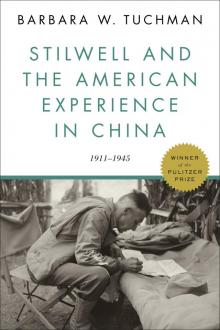 Stilwell and the American Experience in China, 1911-45
Stilwell and the American Experience in China, 1911-45 Bible and Sword: England and Palestine From the Bronze Age to Balfour
Bible and Sword: England and Palestine From the Bronze Age to Balfour The Guns of August
The Guns of August The Proud Tower: A Portrait of the World Before the War, 1890-1914
The Proud Tower: A Portrait of the World Before the War, 1890-1914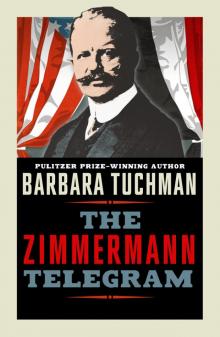 The Zimmermann Telegram
The Zimmermann Telegram A Distant Mirror: The Calamitous 14th Century
A Distant Mirror: The Calamitous 14th Century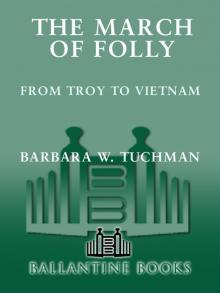 The March of Folly: From Troy to Vietnam
The March of Folly: From Troy to Vietnam The First Salute
The First Salute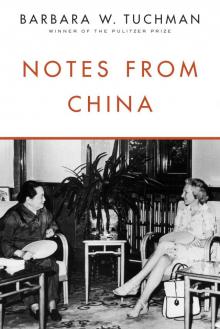 Notes From China
Notes From China Practicing History
Practicing History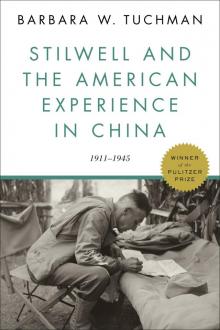 Stilwell and the American Experience in China
Stilwell and the American Experience in China First Salute
First Salute Bible and Sword
Bible and Sword